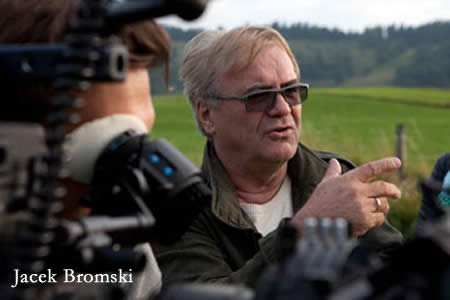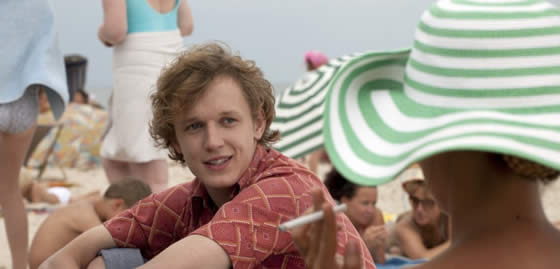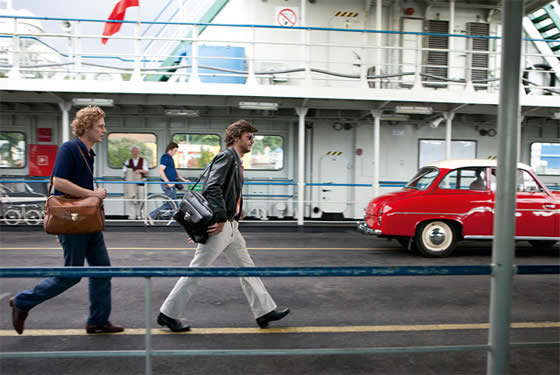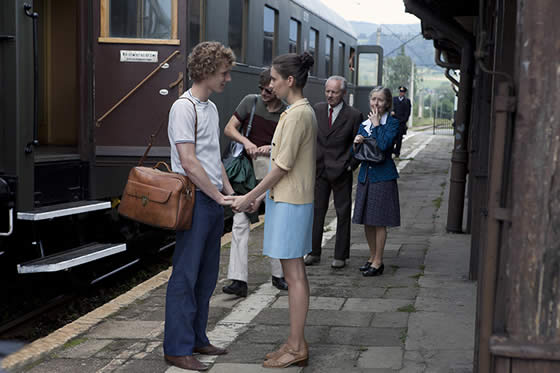 Set in 1969, ONE WAY TICKET TO THE MOON, written and directed by Jacek Bromski, centers on two brothers as they travel across Poland in search of a few instant life experiences. When Adam is drafted into the Polish army and is sent to serve in the submarine section of the Navy, he sets off for the military base in Swinoujscie, along with his older brother Antoni. The two head for the Polish coast, a journey across Poland lasting several days and bringing about visits with old friends, as well as new acquaintances. Antoni’s plan is to make sure that the trip prepares his younger brother for life in the army— including losing his virginity— to avoid becoming the laughingstock of the unit. ONE WAY TICKET TO THE MOON will be screened at Polish Film Festival, Los Angeles.
Set in 1969, ONE WAY TICKET TO THE MOON, written and directed by Jacek Bromski, centers on two brothers as they travel across Poland in search of a few instant life experiences. When Adam is drafted into the Polish army and is sent to serve in the submarine section of the Navy, he sets off for the military base in Swinoujscie, along with his older brother Antoni. The two head for the Polish coast, a journey across Poland lasting several days and bringing about visits with old friends, as well as new acquaintances. Antoni’s plan is to make sure that the trip prepares his younger brother for life in the army— including losing his virginity— to avoid becoming the laughingstock of the unit. ONE WAY TICKET TO THE MOON will be screened at Polish Film Festival, Los Angeles.
Jacek Bromski, a director, screenwriter and producer was born in 1946 in Wroclaw. He studied at the Fine Arts Academy in (donotperse}Warsaw (1965-70), Polish philology at the {donotperse)Warsaw University (1972-74) and film directing at the Lodz Film School (1974-78). Co-founder and literary director of ZEBRA Film Studio. Deputy and chairman of International Association of Audiovisual Authors (AIDAA) and member of the General Assembly of the international producer’s organization AGICOA. Since 2005 member of the Council of Polish Film Institute. Chairman of the Polish Filmmakers’ Association. Laureate of numerous awards at national and international film festivals.
Bijan Tehrani: Your film is an amazing and interesting film because it shows the process of changes in the main characters while they are travelling through Poland at the time of communist rule; how did you come up with the idea of ‘One Way Ticket to The Moon”?
Jacek Bromski: Well I had this idea twenty five years ago and then I abandoned it for a while. Also I had two certain actors in mind to play the two brothers, the main characters of the film, and another director used them in a project as brothers and I did want to repeat him. I had then other ideas for the actors and I waited and waited until I had a distance from the time of communist in power in Poland. This was a good decision because maybe twenty five years ago I was too angry to do it in the way that I did it right now. So that was an old idea that stayed in my mind for a long time.
BT: You have unique and effective way in ‘One Way Ticket to The Moon” to show problems and limitations and the impact of the communist era on people’s lives. But at the same time that you criticize the past, you give it a nostalgic touch also.
JB: At that time I was twenty-something, the same age as the characters in the film, and when you are young you have a lot of energy and you want to do things regardless to your surroundings. Therefore when the audience saw the film for the first time, they were actually laughing, they considered it a comedy, and those  misfortunes of the communist era, somehow stayed in the shadow of these two young and energetic boys who were trying to get the best out of their lives. And then I understood that it is the only way things work. As a matter of fact I didn’t plan ‘One Way Ticket to The Moon” as a comedy. I felt this morbid atmosphere of the regime would prevail in the film, but it didn’t. All the circumstances in the film were true and it has been taken from my own memories. In reviews of ‘One Way Ticket to The Moon” only the young critics believed that they did not remember these days and they said what I am showing in ‘One Way Ticket to The Moon” were impossible to happen at its time period. But I can tell you that we played very close attention to make ‘One Way Ticket to The Moon” as historically accurate as possible.
misfortunes of the communist era, somehow stayed in the shadow of these two young and energetic boys who were trying to get the best out of their lives. And then I understood that it is the only way things work. As a matter of fact I didn’t plan ‘One Way Ticket to The Moon” as a comedy. I felt this morbid atmosphere of the regime would prevail in the film, but it didn’t. All the circumstances in the film were true and it has been taken from my own memories. In reviews of ‘One Way Ticket to The Moon” only the young critics believed that they did not remember these days and they said what I am showing in ‘One Way Ticket to The Moon” were impossible to happen at its time period. But I can tell you that we played very close attention to make ‘One Way Ticket to The Moon” as historically accurate as possible.
BT: For someone that had not grown up in that era, watching ‘One Way Ticket to The Moon” is like traveling to totally foreign land.
JB: Yes of course, I think Poland was different than the rest of the communist countries, it was considered freer in spirit. Censorship was not as hard as other communist countries. For example Polish films were very popular in Poland and other countries but sometimes they were banned in Russia because the Polish characters in Polish films were freer and truer to life than films made in other communist campus. Young people don’t remember these things and this is why making a historical film is so difficult, one generation remembers and the other doesn’t because they did not live at that era and they have their own idea about how things should have been. Let me give you an example in a Polish Film Festival I won an award for the screenplay of this film. In making of ‘One Way Ticket to The Moon” my set designer, did a great job by finding the authentic props and he went through various newsreels and television shows in his research. Therefore I thought that he deserved to receive the best set design award and I asked the jury why he did not received the award and they said that there were too many flags and banners in the film. They did not realize this was quite accurate, every year on the twenty second of July, the town was covered with the red and white flags and banners.
BT: I think this is one of the best road movies that I have ever seen and making a road movie can be very difficult especially when it comes to keeping the audience’s attention, how did you accomplish this in your film?
JB: I consider myself a story teller and I always write my own scripts and I don’t think I just do it, and I could never guess the outcome. If I am lucky to have a good result then I am lucky and that is the miracle of this job that I will never change it for any other. It is the privilege of creating something that other people are pleased to watch. It all depends on the script, and if you have a good script you have a strong base to follow. And then you need a good cast and I had a great cast for ‘One Way Ticket to The Moon”, I went to five Polish theater schools to see young actors and the first time on the screen actors and result was great.
BT: You are also the president of the Polish Filmmakers Association; please tell us a little bit about that?
JB: It is basically a director’s and writers and producer’s guild together and also we have a few actors and other creative professions like set designers and editors, so we have about three and a half thousand members. It is one of the major organizations in Poland in domain of arts. We also deal with the actor’s rights, which is something that I don’t think they have in America. For the filmmakers it is an important organization and I am happy to have been elected four times in a row as president.
BT: Do you have any new projects lined up?
JB: I just finished the editing the rough cut of my new film. I shot it in July and we are currently in Post Production, it is a totally new film called Anatomy of Evil and it is kind of a political thriller, but with a message I would say.
* For screening and events at Polish Film Festival Los Angeles please try the following links & info:
Gala Opening of the Festival
Tuesday, October 7, 2014
Donate to Polish American Film Society and get invitation to the Gala Opening of the Festival at the Egyptian Theatre
Laemmle’s NoHo 7 Box Office and on line ticket sales for the 15th Annual Polish Film Festival Los Angeles are now available.
http://www.laemmle.com/theaters/23
Laemmle’s Royal Box Office and on line ticket sales for the 15th Annual Polish Film Festival Los Angeles are now available.
http://www.laemmle.com/theaters/1

